Liz and I departed from Richmond during September on our
dream holiday of touring with our caravan through France, Portugal and
Spain, chasing the sun as it went south before returning via the French Alps
to ski Les Arcs and Val d'Isere, which is our usual winter holiday.
During the end of November we were at Tarifa, the southernmost point of
continental Europe. It is here that every year dozens some years hundreds,
of people from Morocco and other Afican countries drown attempting to cross
the Straits of Gibraltar to gain clandestine entry into Spain. they die when
their overloaded small boats capsize in the treacherous waters of the
straits..
Whilst parked up along the coast from Tarifa we could see some twenty plus
miles away the continent of Africa, which seemed to be calling us every time
we looked out through the caravan window. Over dinner one evening, Liz and I
talked it over, should we make enquiries about making a crossing over to
Morocco with the caravan and into the unknown and follow the sun further
south. As we were on our own we decided against it and a few days later we
called in at Gibraltar to take on some duty frees before heading north
enroute to the French Alps. As we neared Alicante we started to look for a
campsite for an overnight stop when we spotted several campervans down a
track parked on a beach.

Gibraltar

Wild camping SpainWe joined them and on doing so we were invited to a
barbeque. It was then we were asked if we were on our way to Morocco this is
when Liz and I looked at each other and decided after breaking into the
second bottle of wine we would go. The next day we drove back to Southern
Spain to Algeciras a major port linking Spain with Africa bought an open
return ferry tickets for the following morning, then to Carrefour
(supermarket) to stock up with provisions and alcohol!! (We had been
informed that it was difficult to buy alcohol in Morocco.)

O/O Way South
We stayed overnight in the ferry terminal in monsoon type conditions heavy
rain and thunder. At 8am the following morning, December 1st we where
passing Gibraltar on the high speed catamaran arriving 45 minutes later at
Ceuta, a Spanish enclave. After filling up with duty free fuel we headed for
the border of Morocco which is just ten minutes away from the ferry terminal
It took about 45 minutes to clear immigration and then it hit us as we drove
out of the gates and into what I can only say as going back into time. As we
drove the first twenty miles or so we saw people, mainly women, walking
along side the road carrying bags or bundles on their heads. Donkeys, camels
and dogs wandering all over the place. We even saw a body being brought out
of a house on a door covered with just an old cotton cloth. As we drove
through the towns and villages the women were drawing water from the wells,
or tending to the fields whilst the men sat in cafes, chatting away to each
other sipping coffee and smoking. We felt like turning back.
As we were on our own, we felt very vulnerable but we carried on,. We had to
cross the Jbel Hayya mountain range, from the Mediterranean Coast to the
Atlantic Coast through poverty-stricken villages that had no running water
or electricity. On this road, which twisted and turned for mile after mile
we climbed up and over the pass which was quite a dangerous stretch of road
with burnt out trucks on nearly every hairpin bend. We must have stood out
from miles away as we headed towards these villages as the whole community
just turned out to wave and smile to us as we passed through. As we neared
the Atlantic Coast we joined the motorway that runs from Tangier to
Casablanca. A toll road that costs peanuts to use to what you pay in
Spain/France. There was hardly a vehicle on it. The surface was very good
and we were soon towing at 60plus mph making up for the slow tug over the
mountains listening to Radio 2 in Arabic!! Then out of the blue we saw a guy
crossing both carriage ways on a donkey followed by a women and a couple of
children. We just could not believe it. As we carried on we saw more people
crossing the motorway. On looking on both sides of the road we realised that
when they built this road they split up the villages and did not build
bridges for people in transit to cross, also there were children selling
nuts from tin cans on the side of the road, standing out in the inside lane
trying to get you to stop!!
Late that afternoon we arrived at Sale.(pronounced Sarley) during the rush
hour. Taxis, buses, donkeys, camels, hundreds of people walking down the
middle of the road. You name it we had it. A young student came to our
rescue and guided us on his moped to the campsite. Well worth the couple of
Euros we gave him. Sale is whitewashed city just across the estuary from
Rabat, Morocco's capital. We stayed at Camping de la Plage for five nights a
basic but secure site with a high wall surrounding the entire site with the
gate having 24hour security. We were the only caravan. The other ten or so
were campervans, which was to be the norm throughout the tour.
Within the city walls Sale has not changed for centuries, with its Mosque
and its Souq (Market) Every town and city has its Souq The streets are
narrow with daylight penetrating between the high walls which helps to keep
the streets cool. (Its December and its 25c plus.)In these Souqs is where
people from surrounding areas come to sell their wares and buy goods they do
not produce themselves. You can more or less buy anything, or get it made,
or repaired. You will find the vegetables, fish (when your near the coast)
and spices number one, on your list. We were finding very quickly the people
of Morocco were so nice and made you so welcome into their country that the
fear that we first had on entering Morocco soon disappeared.
With Rabat being just across the river we caught a boat for 20p each and
spent a full day exploring. You will find Rabat and Sale so hassle free, and
its atmosphere is relaxed enough to encourage you to stay a little longer.
We were soon on the road again heading south and as we got further south it
got warmer and warmer. We passed by Casablanca giving it a miss due to it
size and over populated area. Casablanca being Morocco’s largest and most
cosmopolitan city, the home of the extraordinary Hassan 11 Mosque designed
by the French architect Michel Pinseau. The mosque can hold 25000
worshippers!!

Goats feeding
With Casablanca behind us we were on ordinary roads once again which wound
its way through the lush green countryside and villages with young boys,
miles from anywhere looking after grazing goats and sheep. This is when we
got our first glimpse of goats grazing up in the branches of the argan
trees. An unbelievable site. We stopped to take photo’s gave the shepherd
boy some water and of course a tip and we were soon on our way again. That
evening we pulled into Camping Sidi Mogdoul, at the Port of Essaouira.
(Pronounced esa-wera) As we entered into this walled campsite through the
security gates we were surprised to see twenty plus campervans parked up
with there occupants sitting outside soaking up the evening sunshine
drinking a few cans of this and that. We had not seen a European since
leaving Sale, and I must say they were surprised to see us with a 23 foot
caravan behind a 4x4. Within a few minutes some one had offered us a drink,
which was very welcoming after a long 300 miles we had travelled that day.
After a few more drinks an evening meal a shower we bedded down for the
night.
Next morning December 9th we awoke to wall-to-wall sunshine once again.
Since arriving in Morocco we had not seen any rain!! We had heard from home
via E-mails that the weather in the UK was wet and cold. Before leaving
Richmond back in September, I had the car serviced at my local garage at the
same time I obtained an oil and fuel filter (genuine Shogun parts ) to take
with me and from Carrefour in Spain synthetic oil for the engine. By now we
had covered 7500 miles since leaving home. The car had not burnt any oil or
used any water even though it was being worked very hard. But it was time to
do an oil change and have it checked over. I enquired through the security
guard of the camp site to where I could take it. Within 30 minutes mechanic
arrived on site to carry out the work. As it was a job to take a hour or so
to do. (sump guard had to be removed) we left him to it and decided to walk
into Essaouira along the beach which is less than 2 minutes walk from the
camp site. This magnificent beach curves for 10 km to the south, which is
known as the windsurfing centre of Morocco. The winds are very powerful
coming off the Atlantic, which is good news for surfers. Bad news for
fishing boats and ships that gets washed up onto the beaches. There are
several of them wrecked along this stretch.
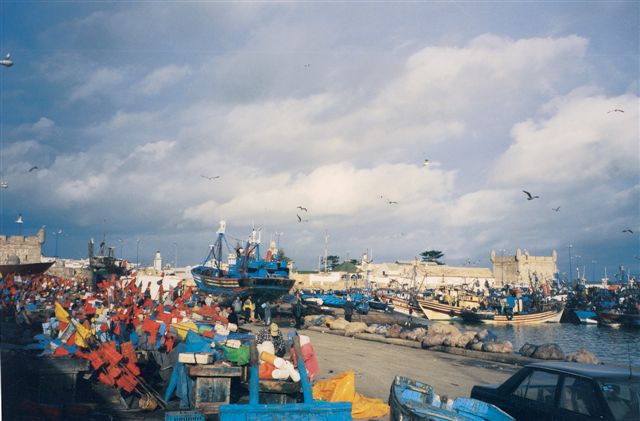
Walled Medina Essaouira
The fortifications of the old city are massive (This is where Orson Wells
filmed the dramatic opening shots of Othello on the ports ramparts) and once
inside its all light and charm with narrow lanes, whitewash houses with blue
painted doors. It was down one of these lanes I had a haircut for a couple
of euros by scissors and a cutthroat razor!! Later we found an open air
restaurant/café and decided to have lunch. We had a tajine (first of many we
would have on this tour) It consisted of chicken for Liz, and lamb for me.
Tajines are famous Moroccan dishes of stews of meat and vegetables cooked
slowly over a charcoal fire. It was very good, but so much I could not eat
it all. So I fed some to a cat that was lurking around. It was then I got a
good telling off from a passing Berber Woman for feeding animals. (obviously
food and bread is especially sacred with all the begging people there is in
this country) We spent the rest of the afternoon at the harbour. What a
place. They still build wooden fishing trawlers here by hand with primitive
tools on the dockside with locals and tourists only feet away from them. No
health and safety here. Further along nets that had been repaired on the
dockside were been loaded onto trawlers including ice, and provisions.

Liz Ice

Trawlers to sea
They were preparing to put to sea to catch sardines. Twenty to thirty of
them. It did not appear to us that they had a problem with fish quotas, or
what size nets they could use. It looked a flourishing industry. I suppose
it will stay that way until they join the E.U. Within minutes the first set
sail the rest followed at high speed.
After a long day out on foot we returned to the caravan. Service complete on
the Shogun and a bill for 100 Dirhams = £6.50!!
The next day as we departed Essaouira a couple of English people with
campervans informed us that we were two weeks away from Christmas Eve. Who
would believe it, the temperature was well up in the 70f and not a Christmas
decoration in site. Super this life, as we headed south into the unknown.
(For us anyway).
Whilst in Essaouira we had been informed about The Cooperative Amal in a
town called Tamanar 70km in the direction we were travelling in. We were
told it was a good place en route to stop for tea and a tour.
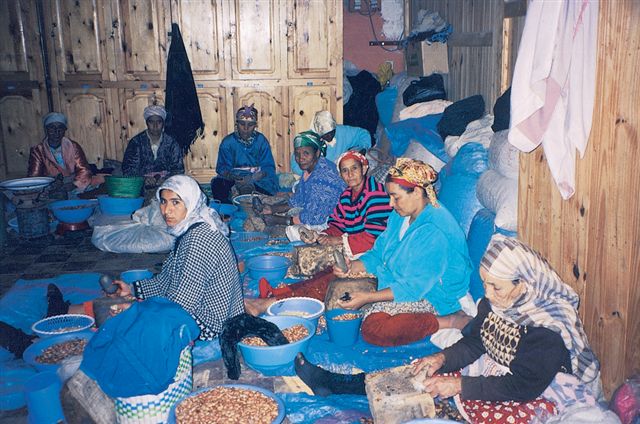
The Coop at Tamanar.
This is a women’s cooperative, which employs 50 full time workers. They
extract oil from the almond like nuts of the local argan tree by breaking
them open on stone blocks, with a stone. It takes 30 kilos of nuts to make
1litre of oil.!! Its just mind blowing. The oil is used in salads and
cosmetics and today is sold around the world.
After driving over some more mountain ranges we headed towards the coast
once again, driving along the cliff tops with fantastic views of the
Atlantic Ocean and the glorious sandy beaches. As we neared Taghazoute we
could see campervans on the beach. Not by the tens or twenties but by the
hundreds. This is where the Europeans come to winter and it’s FREE.!! Well
almost.
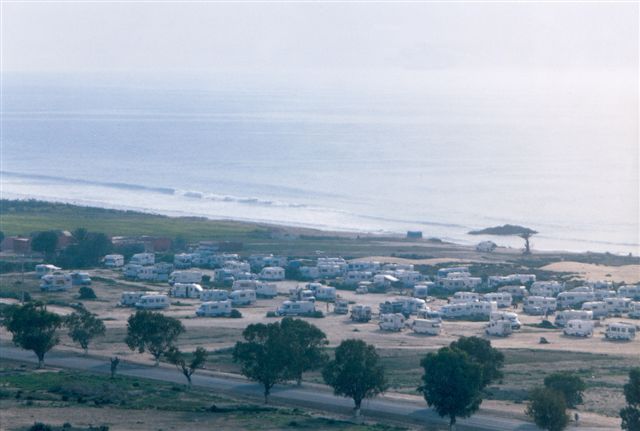
Camping on the beach Taghazoute
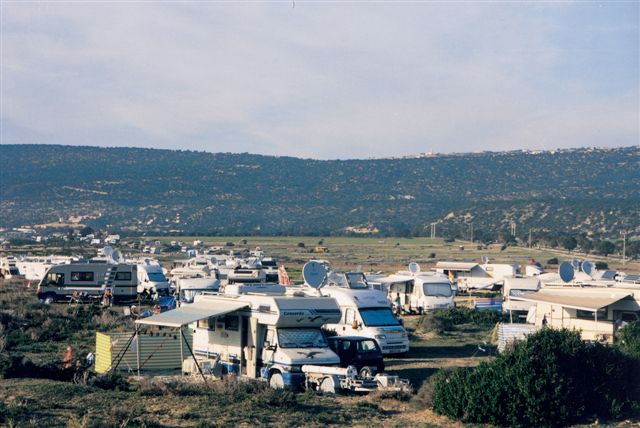
Camping on the beach Taghazoute
We turned off the road and headed onto the camping area and drove around
until we found a very nice spot with a sea view. This was going to be our
patch for the next few months, or so we thought. We were greeted by several
Arabs in there 40/50s with their head man. They spoke to us first in German
then French and when we said do you speak English they said of course, Fish
& Chips!!
They informed us that we had nothing to worry about, they looked after this
part of the beach 24 hours a day and that they patrolled the area throughout
the night and any one walking around that they did not know would be
challenged. The cost of camping and the 24 hour security. 7 dirhams. = .50p
The sun was setting over the sea, we opened a bottle of cava.
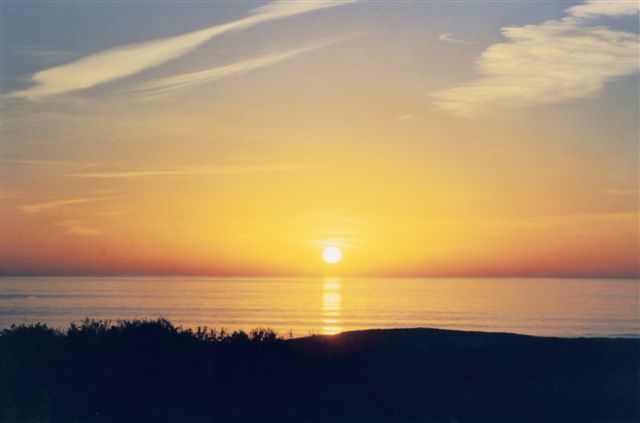
Sunset Taghazoute Beach.
Read Part 2 |


















